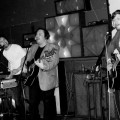There is little preparation for the strange flux that greets a musician when a band ends. For the past decade — since he was just 16 years old, Ed Nash had been known as the bassist for Bombay Bicycle Club, one of the UK’s most esteemed indie bands. But earlier this year, when the band announced that after four albums and endless tours they would be going on indefinite hiatus, Nash found himself faced with the curious task of working out what he wanted to do with his life. “And it was really strange,” he says. “It was only at the point when the band stopped that I actually made the decision to be a musician.”
The problem, Nash is keen to point out, is that “no one really cares if the bass player’s going to do a solo project.” But it was through the acknowledgment of such preconceptions that Nash found the name Toothless — a name he describes as “kind of a joke to myself really” — a nod to the fact that some might expect the bass player’s solo album to be inconsequential, “that it wouldn’t have bite or substance, that it’s toothless.”
Yet Nash’s debut is an unexpected and glorious thing; an album that reveals the secret musical life he lived away from his bandmates, full of “the musical ideas that would come to me, and lyrical ideas I’ve been collecting all my life.”
The Pace of the Passing is more song cycle than a simple collection of tracks. It is marked by its sense of completeness — its themes and preoccupations extending from its lyrics and musical motifs right through to its artwork: thoughts of gathering time, of love and death and relationships past that draw on Greek myth, astronomy, and the work of Charles and Ray Eames, invite guest vocals from The Staves, Marika Hackman, Liz Lawrence, and Tom Fleming from Wild Beasts, and display a love for music that is fiercely melodic, multi-layered and fine-spun.
“The first musical and lyrical idea that I wanted to base the album on was a song called The Sun’s Midlife Crisis,” Nash explains. “I was reading something one day that said the sun was nearly five billion years old, and it’s going to live to be 10 billion years old, so it’s midway through its life.” Nash’s thought was to personify the sun and see it experience all the chaos and introspection of a human midlife identity crisis. “Of course you could have it buying a Porsche or a Ferrari,” he says, “but the other side of it is that actually it’s a terribly, terribly scary thought, that this thing that we all rely on is going to die.”
It seemed natural then to follow this by writing the track Terra — a song about the point where the sun ends. “It’s looking at the passing of time, zooming in and out, at the idea of something being incredibly important to the individual but then in the grand scheme of things being less important. But then within that it’s also the most important thing in the world, because it’s important to you and you’re the person who matters.”
The song Charon drew further on Nash’s astronomical themes but also led him towards Greek mythology — it is both one of Pluto’s moons and the name of the ferryman of Hades who carries the dead souls across the rivers Styx and Acheron. “I think it’s hard to write about dying well,” Nash says. “But I write about dying a lot on this record. It’s weird people don’t write about it more, and people rarely sing about it, because it’s something that happens to all of us.”
Elsewhere, Nash draws on the myth of Sisyphus, the King of Ephyra, punished for self-aggrandisement by being forced to roll a boulder up a hill only to see it roll back down and start again, for eternity. “Really this song’s about friendship,” Nash explains. “It has the line ‘If you ever let go we’ll help you start again.’ It’s about helping people out, that no matter what someone does, no matter how many times they make mistakes you’ll always be there.”
And in one of the album’s gems, Nash recruits The Staves to sing The Sirens, a modern-day interpretation of the Greek myth of the creatures who with their exquisite voices lured sailors to shipwreck on the rocks. “I wrote the song and thought I’ve got to get The Staves to sing on this — these three beautiful ladies, like modern-day sirens with the most amazing voices I’ve ever heard. But I didn’t know them at all. Then two days after I wrote the song they sent through a cover of a Bombay Bicycle Club song and said ‘We’d love to know what you think about it.’ So basically the universe stepped in to help me… It’s probably my favourite song on the album.”
Though there is an intellectual heft to these songs, Nash wears the learning lightly — he is after all a fan, he says, of lyricists who can write “lines that are poignant and meaningful at the same time as being throwaway”. And there is a levity too in The Pace of the Passing’s music — Party for Two, a duet with Liz Lawrence, is a pure, unfettered pop song, while Palm’s Back Side, which features guest vocals from Marika Hackman, is an usual love song that looks at the notion of wishing past lovers well. “All the relationships that I’ve had I can look back happily and see that everyone’s in a better place because it didn’t work for a reason,” Nash explains. “And I think people very rarely say that in love songs.”
Even when touching on more sombre subjects Nash sustains a lightness — on Alright Alright Alright he returns to the subject of death: “But I was trying to say it’s ok to die, it’s not such a scary thing. And I thought to counteract the scary theme of dying you use the famous Matthew McConaughey catchphrase ‘Alright alright alright…’” Meanwhile on I Thought You Were My Friend (I Want to Hurt You) he writes about Mark Chapman, the man who shot John Lennon, “and the idea of someone killing the biggest popstar in the world in order to become famous.” Musically if not thematically, it’s a surprisingly perky song, Nash motivated by the desire for “a poppy hooky melody with something terrible sung over it.”
While he found the process of writing and co-producing these songs “incredibly rewarding” there were moments of struggle. “I was quite comfortable writing music and melody,” he says, “but I’d never written lyrics. And going out and doing this by myself I knew it was do or die, I couldn’t bottle it. But I also knew I couldn’t write about my life — I’m fairly happy, I’ve been in a successful band, I live with my girlfriend in North London. No one wants to hear about that. So I needed something to write about and I found those themes of astronomy and mythology and the passage of time interesting.”
The artwork that accompanies the album — each song given its own image, is inspired by a film by Charles and Ray Eames — the American husband and wife team whose work would prove hugely influential in the worlds of design and architecture. Powers of Ten was produced in 1977 and explores the relative size of things in the universe, zooming up out into space and then back down to the molecular structures of the earth. “It seemed to fit perfectly,” Nash explains. “It’s completely terrifying how at a molecular level everything looks like space, it’s completely mirrored it, as above so below. And so while none of the songs were written with the film in mind, it seemed to relate to them, to the idea of things being less or more relevant, and the perception of time.”
Now 26, newly emerged from a band that occupied 10 years of his life, it is perhaps unsurprising that Nash should find himself concerned by such ideas, by thoughts of maturity and mortality and finding his place in the world. “This album probably is me thinking about all of that,” he concedes. “And I came up with all these ideas and concepts to divert from the fact that I was writing about my own concerns and worries. So if anyone asks me I can say ‘It’s about Matthew McConaughey,’ or ‘It’s about the guy that shot John Lennon.’ But then in there there’s the worry and concern at time passing, and the way that it came into focus with the end of what I’d been doing all my life.”
Toothless – Feb / March Dates
27th February – Stereo, Glasgow
28th February – Sound Control, Manchester
1st March – Lexington, London
2nd March – The Bodega, Nottingham
3rd March – Brudenell Social Club Games Room, Leeds
4th March – Institute 3, Birmingham
5th March – The Hope, Brighton




